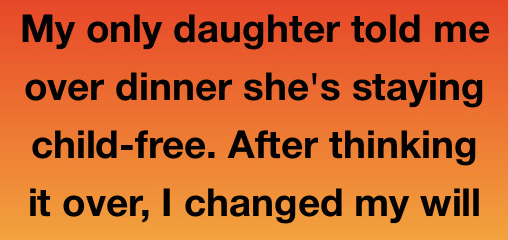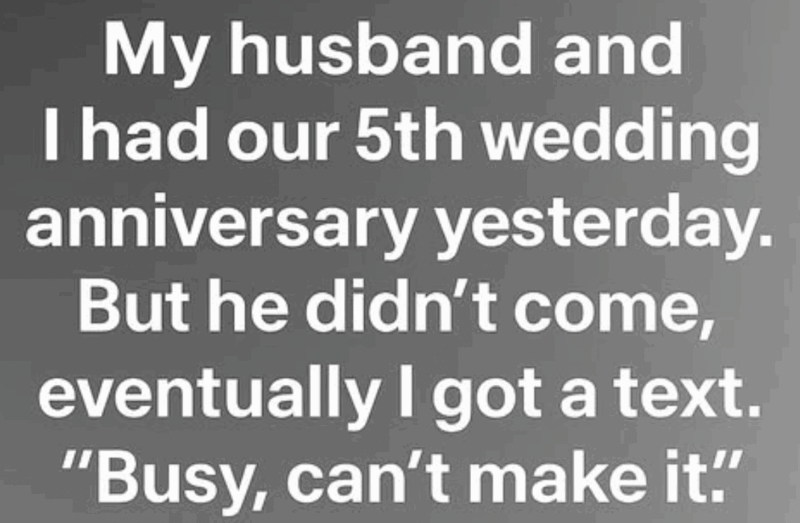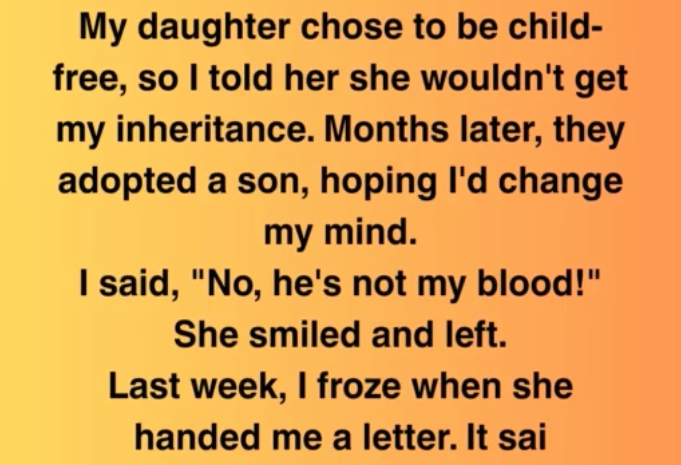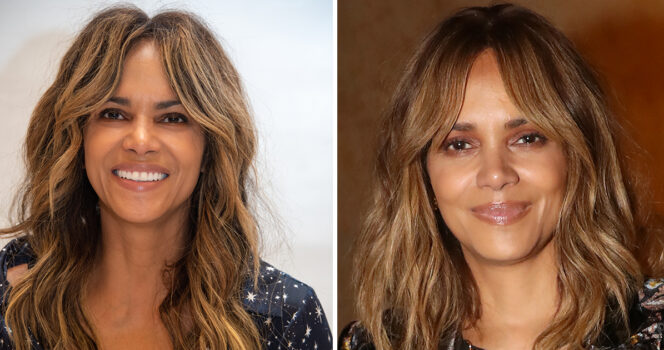During a quiet dinner, my only daughter, Ruth, shared that she’d chosen a child-free life. After reflecting on her words, I revised my will, allocating most of my estate to my nephew, who has children. When Ruth learned of this, she didn’t react with anger or tears. Instead, she offered a gentle smile and said, “Thank you, Dad. I’ve been at peace with my choice for years.”
I froze, my fork hovering over my plate. Her tone was steady, almost appreciative.
We sat in our familiar corner of the small Italian restaurant she adored as a child. The same red-and-white checkered tablecloths, the same warm garlic bread, the same faded photo of an elderly woman rolling pasta adorned the walls. The setting should have felt cozy, but her calm response unsettled me.
“You’re not upset?” I asked, leaning forward, searching her face.
She sipped her wine and gave a slight shrug. “Why would I be? You’re staying true to what matters to you, Dad. I’m doing the same.”
Her words landed heavily. I gazed at Ruth—my thirty-four-year-old daughter, sharp, driven, running her own marketing agency she’d built from the ground up. I was proud, though I rarely said it enough. Yet, deep down, I’d always held this quiet hope that she’d one day embrace a traditional family life.
“Still,” I said, twisting my napkin, “it feels like I’m penalizing you.”
She reached out, her hand resting on mine. “You’re not. You’re honoring your values. I understand.”
Her sincerity was disarming. There was no resentment, no sharp edges. She’d made peace with my decision long before I’d even made it.
That night, sleep eluded me. I replayed her words, expecting a heated argument or emotional plea. Instead, I found grace.
I thought back to her childhood—how she’d arrange her stuffed animals and teach them with authority, or how she’d nurse stray birds with bits of cereal. Ruth always had a bold, independent spirit. Even as a teenager, she showed little interest in weddings or baby dolls.
Yet, I’d assumed she’d eventually shift her perspective.
The next morning, my nephew called, thrilled about the inheritance. He spoke of better schools for his kids, a new home. His gratitude was heartfelt, but I felt empty after hanging up.
Weeks passed, and Ruth and I continued our routine—dinners, coffee meetups. On the surface, nothing had changed. But I noticed subtle shifts: a hesitation when she mentioned travel, a sidestep around family gatherings.
One afternoon, she invited me to her office to share something special.
I stepped into a vibrant workspace filled with greenery and young professionals typing away. She guided me to a glass-walled room plastered with colorful sticky notes.
“Look at this,” she said, pointing to a flowchart with her name at its center. “This is my five-year plan. I’m expanding—new branches in Austin and Portland.”
I nodded, genuinely impressed. “That’s ambitious.”
“It’s my legacy,” she said with a proud smile.
That word—legacy—echoed in my mind.
Her voice softened. “Dad, I may not have children, but I’m creating something meaningful. My team, my clients—they’re my family.”
I stood there, feeling both pride and a pang of humility. I’d been measuring her worth by a narrow standard.
From then on, I paid closer attention. I saw how she mentored her employees, how she glowed when someone thrived, how she quietly supported local shelters and women’s groups.
One evening, the doorbell rang. It was Ruth.
Her eyes were red, but she wore a faint smile. “Got time for a drink, Dad?”
I poured us whiskey, and she curled up on the couch, legs tucked under like she did as a child.
“You okay?” I asked.
She stared at her glass. “Lila—you remember my college friend?—she passed away.”
I nodded. Lila’s loud laugh used to fill our home.
“Car accident,” Ruth murmured. “Thirty-five. Gone like that.”
We sat quietly for a moment. Then she spoke words that stayed with me.
“When I think about the will, Dad, it’s not about the money. It’s about how you see me.”
My chest tightened. “Ruth…”
She raised a hand. “I’m not upset. But it showed me—we all want to feel our lives have meaning.”
“You do,” I said, my voice thick with conviction.
She gave a weary smile. “Then maybe that’s enough. Not approval—just understanding.”
After she left, I sat, the TV droning in the background, unseen. She was right. I’d tied meaning to a single idea of family. But Ruth was crafting a legacy of her own.
The next day, I called my lawyer.
“I need to make changes,” I said.
“Again?” he asked, surprised.
“Yes,” I replied, resolute. “Something important.”
I kept a portion for my nephew—he deserved it—but I rewrote the rest. I included a letter for Ruth, not just legal terms, but words from my heart, telling her how deeply proud I was.
I didn’t tell her immediately.
Time passed, and life settled into a rhythm.
One weekend, we visited the cabin we used to rent when she was a teen. Fishing, card games, charred marshmallows.
As the sun dipped over the lake, I handed her the letter.
She read it quietly. When she finished, she rested her head on my shoulder.
“Thank you,” she whispered. “Not for the money. For seeing me.”
For the first time in ages, I felt I’d done right.
But the story continued to unfold.
Six months later, Ruth called me over. “Dad, I want you to meet someone.”
I raised an eyebrow. “Oh?”
“Her name’s Mika. She’s been part of my life for a while. I wasn’t ready to share until now.”
Mika was warm, with kind eyes and a clear love for Ruth. Suddenly, her choices felt even clearer, her strength even deeper.
One evening, as we cleaned up after dinner, Mika pulled me aside.
“Thank you for supporting her,” she said quietly.
I smiled. “Took me a bit, but I got there.”
A year later, they married in a small backyard ceremony. Ruth wore a blue dress, dancing barefoot under twinkling lights.
Then, three years after that first dinner, Ruth invited me for brunch.
I walked in to find toys scattered across her floor.
She lifted a tiny baby girl into her arms. “Dad, meet Ada. Mika and I adopted her last month.”
My legs wobbled. Ruth’s eyes shimmered with tears—not of doubt, but of joy.
“I thought kids weren’t your plan,” I said, laughing through my own tears.
She smiled. “I didn’t want to give birth. But when we met Ada, we knew.”
And I understood: family isn’t only about biology. It’s about who you choose, who you stand by, who you love fiercely.
The will was never about money.
It was about perspective.
Mine had expanded, just as Ruth’s world had.
If you’re wondering what makes a life meaningful, it’s not always the expected path. It’s the legacy you create through the lives you touch, the kindness you share, the courage to live authentically.
Ruth showed me that.
So did Ada.
And perhaps, in its own way, the will changed more than my estate.
It changed me.
If this story resonates, share it. Someone out there needs to know that being different doesn’t mean being less. Love—true love—makes space for everyone.
Thank you for reading.




